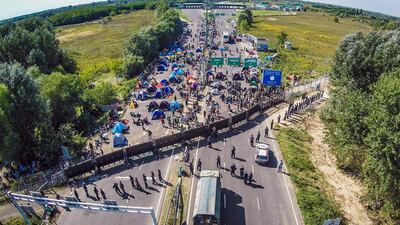The defence industry has never been happier. With sales at unprecedented levels – US$65 billion (Dh 238bn) in 2015, according to the Global Defence Trade Report – France, the United States, Canada and Britain have become global leaders in arms exports. The Middle East is the largest importing region and weapons companies such as Raytheon, Oshkosh, Thales, General Dynamics, Northrop Grumman and Lockheed Martin are benefiting from continuing conflicts in Syria, Iraq and beyond.
These economic advantages are now expanding further afield. The refugee crisis engulfing Europe over the past 18 months has caused untold misery, with thousands drowning in the Mediterranean, racist attacks against Arab arrivals and restive populations increasingly turning against migrants fleeing Syria, Afghanistan, Libya, Iraq and Africa.
But largely ignored in the commentary and reporting from European countries struggling to cope has been the financial beneficiaries of huge migration: the arms manufacturers, private security corporations, and intelligence and surveillance multinationals. For them, Europe’s desperate desire to militarise and monitor its borders has led to a huge surge in profits.
After the attacks in Paris last November, share prices in some of these defence firms rose strongly. Lockheed Martin executive vice president Bruce Tanner told a Credit Suisse conference in West Palm Beach in the US in December that there were “indirect benefits” from the war in Syria. There was “an intangible lift because of the dynamics of that environment and our products in theatre”, such as F-22s and F-35 jets.
A recent report from NGOs Stop Wapenhandel and Transnational Institute, Border Wars, provides comprehensive evidence of Europe’s zeal to outsource its border security and explains the direct link between wars in the Middle East and profits from European policies.
The European Commission wants to reform its border security agency Frontex into a more influential European Border and Coastguard Agency. This will mean even greater windfalls for defence multinationals. The report explains that the European border security industry was estimated at €15 billion (Dh61.6bn) in 2015 and is predicted to rise to more than €29 billion annually by 2022. The budget of Frontex increased 3,688 per cent between 2005 and 2016 from €6.3m to €238.7m and European states are obliged to strengthen their borders as a condition of membership.
“There is one group of interests that have only benefited from the refugee crisis, and in particular from the European Union's investment in ‘securing its borders’,” the Border Wars report finds. “They are the military and security companies that provide the equipment to border guards, the surveillance technology to monitor frontiers, and the IT infrastructure to track population movements.”
Crucially, the report shows that “far from being passive beneficiaries of EU largesse, these corporations are actively encouraging a growing securitisation of Europe's borders, and willing to provide ever more draconian technologies to do this”. The large defence players in Europe include Airbus, Finmeccanica, Thales, Safran and Indra.
Finmecannica, Thales and Airbus are key lobbyists with the privately run European Organisation for Security and they push for tighter border security. Many of their suggestions, including the establishment of a cross-border security agency, have been adopted by the EU.
These companies are also three of the top four European arms traders selling weapons to nations in the Middle East and Africa that are experiencing the greatest unrest and fuelling refugees fleeing for their lives. In other words, these companies are making money from both selling weapons to repressive regimes and benefiting from the human fallout in Europe.
It’s a convenient convergence of interests and has generated virtually no public outcry. This is because populations across Europe are increasingly voting for political parties that believe in tight border controls and express little sympathy for outsiders trying to get in. The recent Brexit vote in Britain was won largely on a small majority of citizens wanting to “take back control of our borders”. The fact that this can only be achieved by privatising the border security network – states don’t have the technology or expertise to do it themselves – is either unknown or seen as a necessary evil.
Israeli firms are the only non-European receivers of research grants for border security under a 1996 agreement between Europe and Tel Aviv. This has already led to Hungary and Bulgaria expressing serious interest in 2015 of establishing high fences reminiscent of the barrier separating Israel and Egypt and Israel’s separation barrier through the occupied West Bank. Israel’s decades of experience controlling millions of Palestinians in the West Bank and Gaza, through drones, fences, walls, weapons and surveillance, is the perfect experience Europe craves during its current crisis.
Writer and activist Jeff Halper calls this the “global pacification industry”, parlaying years of occupation and battle-tested technology in the service of controlling borders and people. For example, Israel Aerospace Industries has worked with Airbus to create a surveillance drone, used in Gaza, to track refugees in Europe.
The privatisation of Europe’s borders is accelerating even as the number of refugees arriving on the continent has fallen this year. The EU has a long-term plan to militarise its borders and be prepared for any further influx of unwanted migrants. Defence firms making a fortune from migration flows should make us question the morality of the world’s obsession with the outsourcing culture.
Antony Loewenstein is a Jerusalem-based independent journalist and author
On Twitter: @antloewenstein

